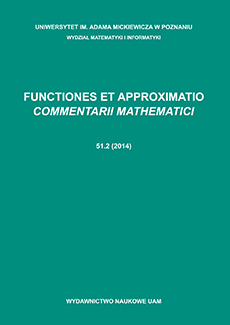Funct. Approx. Comment. Math. 70 (2), 177-199, (June 2024) DOI: 10.7169/facm/2078
KEYWORDS: semi-local limit theorem, divisors, Bernoulli random variables, i.i.d. sums, Theta functions, distribution, prime numbers., 60F15, 60G50, 60F05
Let $X$ be a square integrable random variable with basic probability space $(\Omega, \mathcal{A}, \mathbb{P})$, taking values in the lattice $\mathcal{L}(v_0,1)=\big\{v_k=v_0+ k,k\in \mathbb{Z}\big\}$ and such that $\t_X=\sum_{k\in \mathbb{Z}}f(k)\wedge f(k+1)>0$, where $f(k)=\mathbb{P}\{X=v_k\}$, for each $k$. Let $X_i$, $i\ge 1$ be independent, identically distributed random variables having the same law as $X$, and let $S_n=\sum_{j=1}^nX_j$, for each $n$. Let $\bar{\mu}= \{\mu_k, k\in \mathbb{Z}\}$ be a sequence of non-negative reals such that $0<\mu_k<f(k) $, if $f(k)>0$, $\mu_k=0$ if $f(k)=0$, let $\mu= \sum_{k\in \mathbb{Z}}\mu_k$, and let us assume that $1- \mu < \t_X$. Let also $\bar{\tau}= \{\tau_k, k\in \mathbb{Z}\}$ be a sequence of non-negative reals satisfying the (solvable) equation: $ {\tau_{k-1}+\tau_k \over 2} = f(k) - \mu_k,$ for all $k \in \mathbb{Z}$. Let $\vartheta = \sum_{k\in \mathbb{Z}} \tau_k = 1- \mu.$ Further let $s(t) =\sum_{k\in \mathbb{Z}} \mu_k\, e^{ 2i \pi v_kt}$ and $\rho$ be such that $1-\vartheta<\rho<1$. Let $\widetilde{X}$ be the random variable associated to $X$ and $\bar{\mu}$, and defined by the relation $\mathbb{P}\{\widetilde{X} =v_k\}= {\tau_k}/{\vartheta}$, for all $k\in \mathbb{Z}$. We prove the following uniform semi-local theorems for the class $\mathcal{F}=\{F_{d}, d\ge 2\}$, where $F_{d}= d\mathbb{N}$. \begin{enumerate}[\quad (i)] \item There exists $\theta=\theta(\rho,\vartheta)$ with $ 0 < \theta < \vartheta$, $C$ and $N$ such that for $n \ge N$,\begin{multline*}\sup_{u\ge 0}\sup_{d\ge 2} \Big| \mathbb{P}\{ S_n+u\in F_{d}\} - {1 \over d}-{1 \over d}\sum_{0 <|\ell|< d }\Big(e^{(i\pi {\ell \over d}-{\pi^2\ell^2 \over 2 d^2}) } \vartheta \mathbb{E} e^{2i \pi {\ell \over d }\widetilde{X}}+s\big({\ell \over d}\big)\Big)^n \Big|\\ \le \frac{C}{\theta^{3/2}}\frac{(\log n)^{5/2}}{n^{3/2}}+2\rho^n.\end{multline*}\item Let $\mathcal{D}$ be a test set of divisors $\ge 2$, $\mathcal{D}_\varphi$ be the section of $\mathcal{D}$ at height $\varphi$ and $|\mathcal{D}_\varphi|$ denote its cardinality. Then,\[\sum_{n=2}^\infty \sup_{u\ge 0} \sup_{\varphi\ge 2} {1 \over |\mathcal{D}_\varphi|} \sum_{d\in \mathcal{D}_\varphi} \Big| \mathbb{P} \{d|S_n+u\} - {1 \over d}\Big| \le \frac{C_1}{\vartheta} + \frac{C_2}{\theta^{3/2}} + \frac{2\rho^2}{1-\rho},\]where $C_1=\frac{2e^{\pi^2/4}}{(1-e^{-\pi^2/16})}$, $C_2= C\sum_{n=2}^\infty \frac{(\log n)^{5/2}}{n^{3/2}}$.\end{enumerate}

